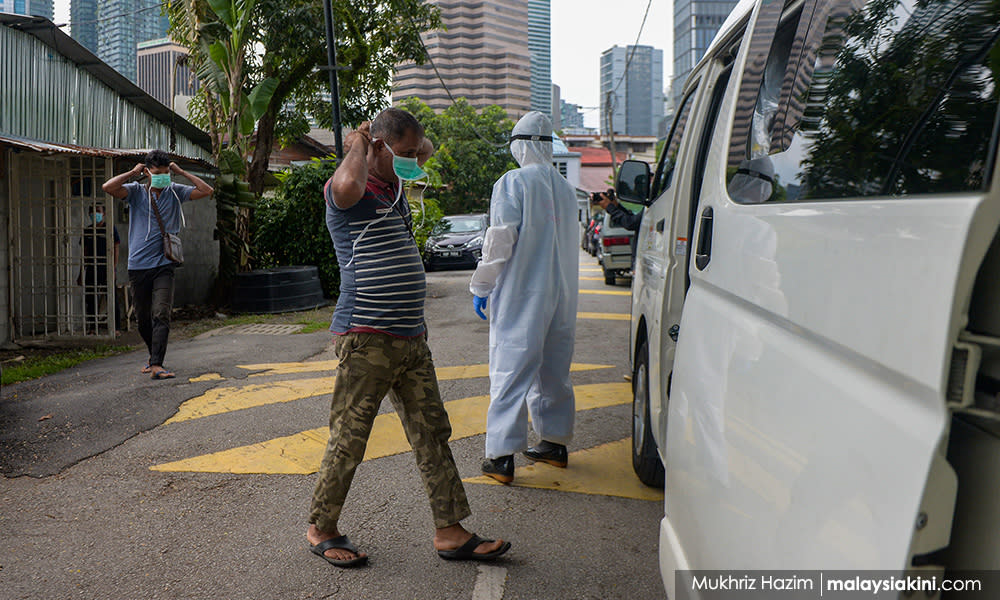Top-down racism, xenophobia harming migrant workers, refugees - NGO

The Migrant Workers' Right to Redress Coalition (MWR2R) has raised concerns over how institutionalised racism and xenophobia harmed migrant workers and refugees from top-down during the Covid-19 pandemic period.
In a virtual press conference, MWR2R spokesperson and social activist Adrian Pereira said the group received complaints on migrant workers who resided at one condominium that had to undergo testing for Covid-19.
"The condominium management forced the migrant workers to take the test," he said, without naming the condominium.
"Another case involved refugees who were locked in their home, based on suspicion that they were Covid-19 positive," said Adrian, who is also the executive director of North South Initiatives (NSI), a migrant worker rights group.
"These are the symptoms of gross institutionalised racism and xenophobia, from a policy that had spilt over into society. It is going to take a lot of work for the government to address it, especially through the structure of integration programme and socialisation programme over the long term.
"Unfortunately, the Covid-19 situation had made this a bit chronic," said Adrian, adding that even some of the local authorities were barring migrant workers and refugees from working at markets.
Adrian was joining other rights groups to highlight the alarming issues affecting migrant workers, domestic workers, refugees, asylum seekers, and foreign spouses in the country.
At the conference, MWR2R urged the government to include undocumented migrant workers and foreign spouses in the national vaccination programme, in which 83 percent of the population will be vaccinated for Malaysia to achieve herd immunity in 18 months.
"We would urge that no one in Malaysia is excluded from this programme. We would urge the government to make sure that the circumstances of every person are considered.
"If we do not do this, there will be a serious gap in the ability of the vaccination effort to make the sort of difference to the pandemic that many people are hoping for," said Tenaganita executive director Glorene Das.

She requested the government to engage with the NGOs in discussion to facilitate the vaccination process.
However, Adrian expected that the process of vaccinating undocumented migrant workers is not going to be easy for the government.
"The government is proposing for employers to pay for migrant workers' vaccination. If this is the case, this means that only documented workers will have access to vaccination," he said.
"Vaccination for formal workers should be managed by their employers and should be safe. But in the case of undocumented migrant workers, there will be a challenge," he said.
Adrian was asked if the migrant workers dare to come out or are afraid to approach the government for vaccination out of a deep sense of fear.
In March 2020, Putrajaya had urged the migrant workers involved in the tabligh cluster to come forward for Covid-19 test and gave assurances that the government would not focus on the validity of their travel documents. However, Senior Minister Ismail Sabri Yaakob later said illegal immigrants found in areas under an enhanced movement control order (MCO) would be sent to detention centres when the MCO ended.
The government was slammed for breaking its promise.
Lack of rights
MWR2R said thousands of migrant workers were made to work long hours in substandard conditions, and they were exposed to abuse of employment laws, non-payment of wages and arbitrary repatriation without any support and avenues to seek remedy.
"There is also potential use of child labour as exemplified by the recent raid on a factory in Klang where 38 refugee children were found to be employed," it said.
MWR2R was also unhappy with the lack of information about conditions at detention centres and lack of rights to seek redress for those affected by a sudden closure of workplaces, delay in renewal of permits and visas, recalibration and arbitrary repatriation.
"The government must ensure that adequate resources are provided to the Labour Office to allow them to far more effectively carry out their monitoring and enforcement of conditions at the workplace.
"This includes giving the necessary political and financial support to appoint significantly more workplace inspectors. Otherwise, abuses will continue with impunity and conditions of modern-day slavery will continue to develop.
"The government must also provide to the public up-to-date data on the number of raids being conducted, the number of people detained, the number of people charged, what happens to them...Transparency is an essential basis for effective actions," said the group.


